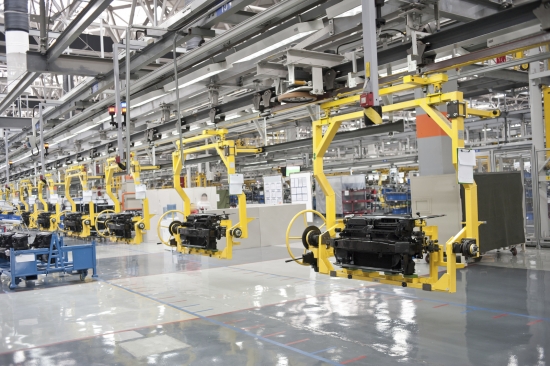3 minute read
Prime Minister to unveil plans for Modern Industrial Strategy

PM to announce Modern Industrial Strategy / Picture: Getty/iStock
Prime Minister Theresa May will use her first regional Cabinet meeting today to launch proposals for a modern Industrial Strategy to build on Britain’s strengths and tackle its underlying weaknesses to secure a future as a competitive, global nation.
At the heart of the Strategy green paper published today is an offer to businesses to strike new ‘Sector Deals’, driven by the interests of firms and the people they employ, to address sector-specific challenges and opportunities. As part of the deals government will be prepared to offer a range of support, including addressing regulatory barriers to innovation and growth, looking at how we can use trade and investment deals to increase exports, or supporting the creation of new institutions to provide leadership, support innovation or boost skills.
The Industrial Strategy is a vital part of the Plan for Britain set out by the Prime Minister last week. It will drive growth right across the United Kingdom, using major new investments in infrastructure and research to drive prosperity – creating more high-skilled, high paid jobs and opportunities. The green paper also sets out plans to strengthen institutions in each part of the country to support their specific strengths – whether it’s building up local trade bodies, or creating new educational institutions, making it easier for business to access finance outside London or getting a stronger business voice into local government.
The Prime Minister will tell a Cabinet meeting in the North West this morning that a truly modern British Industrial Strategy must make Britain a hive of new industries which will challenge the companies and industries of today.
Prime Minister Theresa May said: “The Modern Industrial Strategy will back Britain for the long term: creating the conditions where successful businesses can emerge and grow, and backing them to invest in the long-term future of our country.
“It will be underpinned by a new approach to government, not just stepping back but stepping up to a new, active role that backs business and ensures more people in all corners of the country share in the benefits of its success.”
Business & Energy Secretary Greg Clark added: “This is an important step in building a modern, dynamic industrial strategy that will improve living standards and drive economic growth across the whole country. A modern British Industrial Strategy must – build on the UK’s strengths and extend excellence into the future; close the gap between the the UK’s most productive companies, industries, places and people and the rest; and ensure we are one of the most competitive places in the world to start and grow a business.
“We are inviting businesses and workers to contribute to this vision to help us create a high-skilled economy where every place can meet its potential.
The green paper also sets out technologies where Britain has strengths in research and development which could be supported through the government’s new Industrial Strategy Challenge Fund, including: smart energy technologies; robotics and artificial intelligence and 5G mobile network technology. This fund is part of £4.7 billion of additional R&D funding announced by the Prime Minister in November, a bigger increase than in any parliament since 1979.
The approach outlined today builds on what exists already in sectors like automotive and aerospace – with individual firms taking the initiative to organise their sectors, backed by institutions or organisations which enable vital partnership on research and development throughout the supply chain.
In aerospace, close collaboration between government and industry including through the Aerospace Growth Partnership has been instrumental in creating one of the world’s best business environments for advanced engineering, design and manufacture – with thousands of people employed in high-skilled jobs.
Terry Scuoler, CEO of EEF, the manufacturers’ organisation, commented: “This is an important first step towards creating a comprehensive, consistent and long-term industrial strategy that will help Britain adjust to a more globally-focused, post-Brexit economy. Manufacturing has a key role to play and we look forward to working with the government on crystallising this into a strategic framework that will work and deliver for industry.
“The end result of this process must be an industrial strategy that lives up to the promise of driving different behaviours and outcomes for the British economy. This requires the whole of government working together to support it, with clear leadership from the Prime Minister and her whole Cabinet.”
The Modern Industrial Strategy green paper sets out a plan to improve living standards and economic growth by increasing productivity and driving growth across the whole country. To achieve that goal, the green paper sets out ten strategic pillars to underpin a new government approach:
• Investing in science, research and innovation
• Developing skills
• Upgrading infrastructure
• Supporting businesses to start and grow
• Improving procurement
• Encouraging trade and inward investment policy
• Delivering affordable energy and clean growth
• Cultivating world-leading sectors
• Driving growth across the whole country
• Creating the right institutions to bring together sectors and places